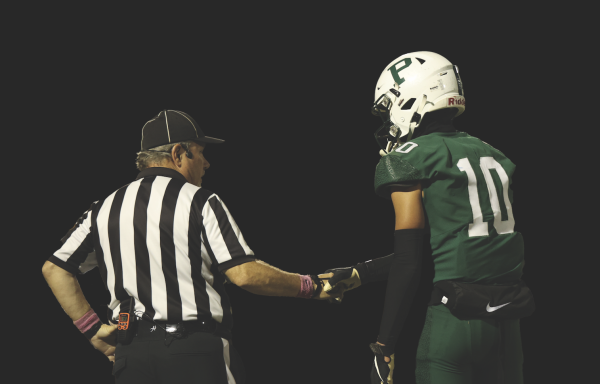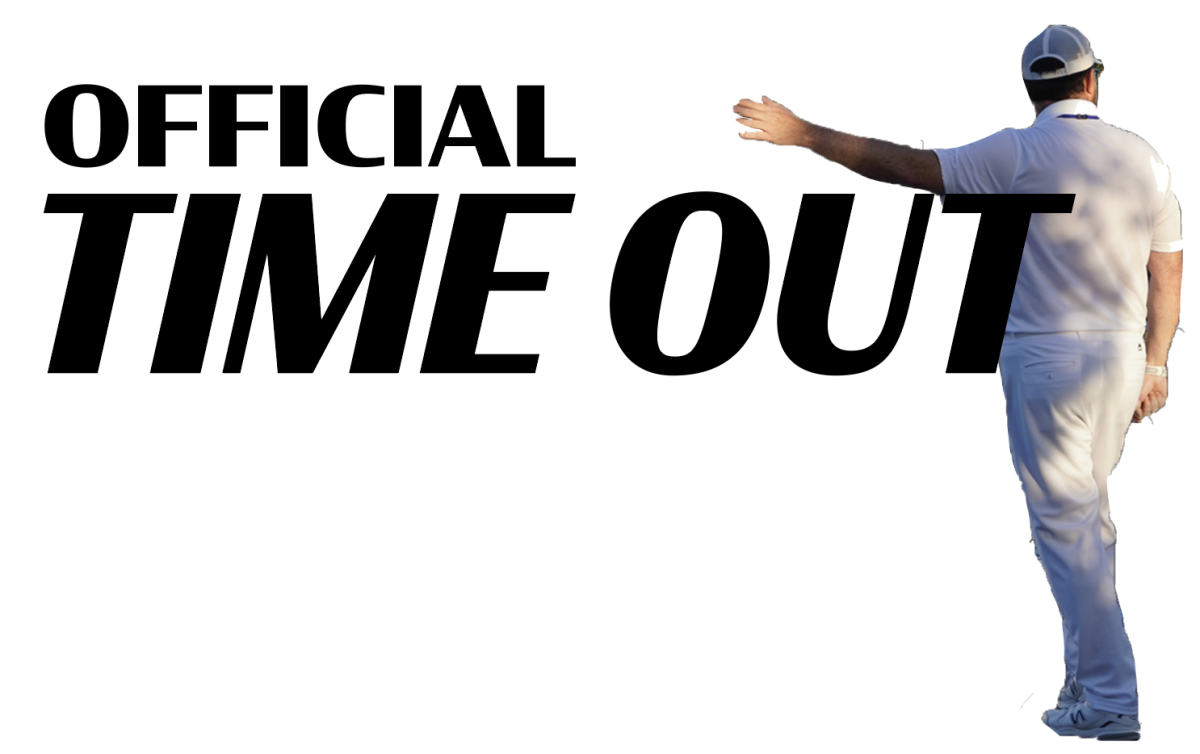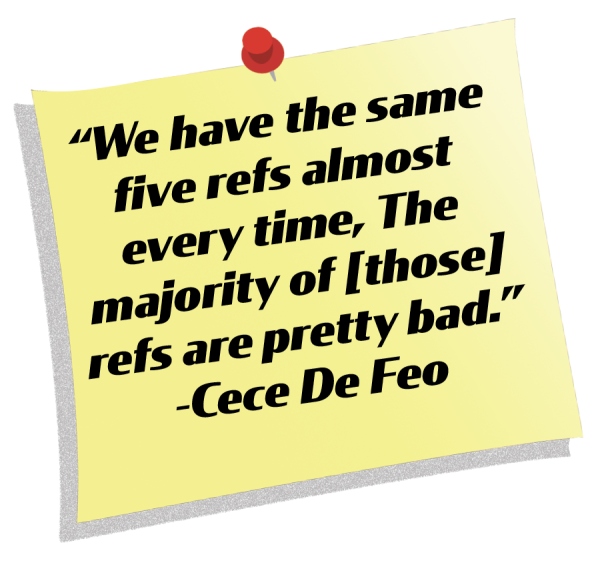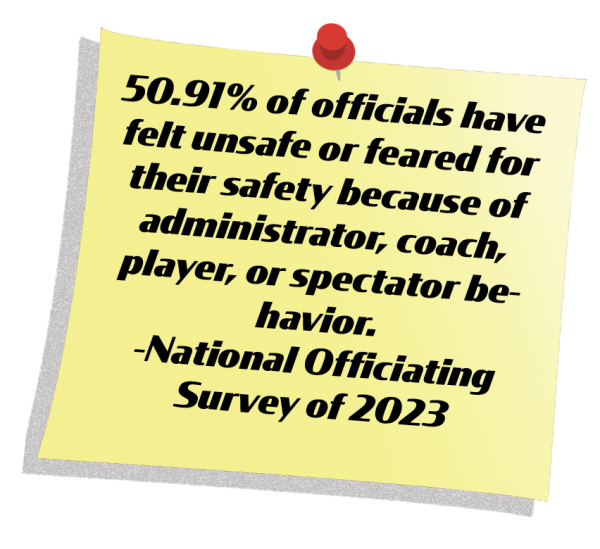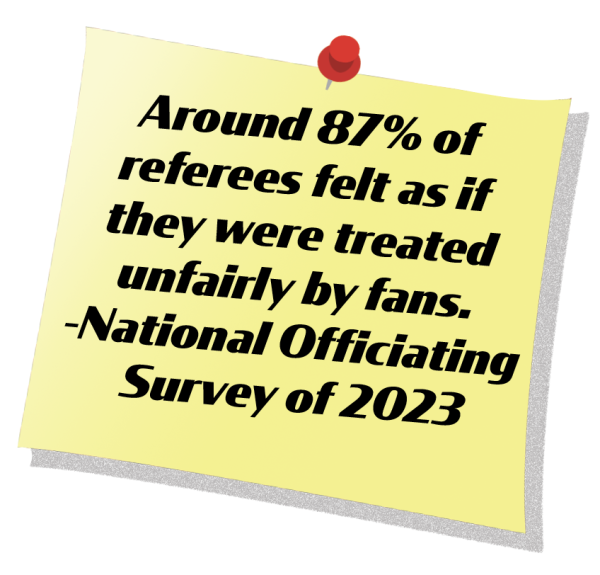In nearly every sport, you need a ref. From water polo to tennis to wrestling, it’s important to have an educated mediator between player or team and opponent who can resolve all issues pertaining to the rules of the game. Without refs, there is no game. But according to Thomas Orr with the Center on Sport Policy and Conduct, more than 50,000 refs have left their posts since 2019.
Why are refs leaving the job, and more importantly, what can we do to stop this before it jeopardizes high school sporting?
Sports such as football, volleyball, soccer, water polo, and basketball (just to name a few) have been seeing the effects of this shift with a detrimental shortage of referees.
One primary reason for the loss of refs is that it is now a part of many sports to openly harass and disrespect refs.
Referees have the power to make decisions that could make or break games and because of this, people have the idea in the back of their minds that the referee chooses the fate of the game, not the players.
For refs, no matter which way the call is made, they still receive criticism, as junior football player Joey Kessler notes.
“No matter the outcome, you’re always going to be left with unhappy people to deal with,” Kessler said.
Hostility towards referees serves as the catalyst for a vicious cycle that thrives on the harmful player vs. referee mentality.
ears also served as an esteemed water polo referee. According to him, sports fans have a culture of disrespect for the refs.
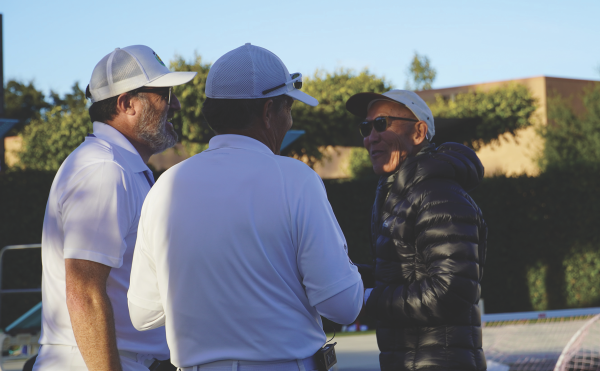
“Sports [fans] historically have been known as people that just rag on the refs thinking they know everything and know the rules,” Dye said.
Even at the highest level of professional sports, questions about the validity of officials are common. An example of this could be the possibly most iconic goal in soccer history, Diego Maradona of Argentina’s ‘hand of god’ goal. In the quarter-finals of the World Cup, Maradona used his hand to push the ball into the goal, bring Argentina into a 1-0 lead, and eventually defeat England and advance them to the final. Despite the clear handball, the referees remained oblivious and the goal was counted, going down as arguably the most famous blown call and goal in history.
Controversial calls are not just limited to soccer; NBA referee Scott Foster has grown famous in the basketball world recently even earning the nickname “The Extender,” for his tendency to make bad calls that extend playoff series.
Complaints don’t stop at the professional level; they can extend to youth and high school sports as well, despite the seemingly lower stakes.
With the shortage of refs in the current day, leagues and sections are forced to reuse the same referees for every single game, resulting in the same referees officiating the same teams over and over.
Some Paly athletes notice this lack of refs, like junior Alec Bonnard, who plays varsity soccer for the Vikings.
“I’ve certainly noticed that in club soccer, we tend to have the same refs for each of our games, there’s only so many refs we can have,” Bonnard said. “I think there’s always something to complain about refs, especially because in games, if a ref starts to [make bad calls], and the more and more you complain, sometimes there’s more and more of the bad calls that are against you.”
Some Paly athletes, like sophomore Cece De Feo, believe that due to the small pool of refs, they can build opinions on teams, and therefore biases can be built against schools and players that they commonly officiate
“Because a lot of the refs have been officiating here for years, the coaches and refs all know each other, so I think if they don’t like your coach, then they are going to have a bias towards the other team,” De Feo said.
Experiences with refs can provide a wide range of outcomes, with many different opinions about the quality of refs from athletes, students, and coaches alike.
A common thought is that refs lack passion for the sport, and have little experience with it besides short training.
“I think I’ve definitely had a lot of refs that don’t [have passion], they just learn the game so they could ref and they don’t actually care about the sport,” De Feo said. “They just make calls either so one team can just win faster or they’re making bad calls because they’re not paying attention.”
This sentiment is shared by Bonnard.
“It can be frustrating as a player when there’s a referee and they don’t look like they are entirely giving their full effort to officiate the game correctly,” Bonnard said.
However, dissatisfaction with a call made by a ref doesn’t warrant the intense amount of harassment that many refs have to endure. Because fans and athletes sometimes feel entitled to overreact when a call doesn’t go their way, many refs feel like it’s not worth it for them to come out and give their time simply to get disrespected.
“Why would I want to come out for a certain amount of money, just get yelled at and screamed and not respected?” Dye said.
Many referees are leaving the profession due to harassment from athletes, coaches, and parents, but the pay level and the challenge of becoming a ref also pose problems for refs. From such factors, the shortage is born.
“There is definitely a shortage, there are rescheduled games to get refs because there’s no one to take the game, they’re all taken,” De Feo said. “Sometimes even coaches ref because there’s not enough refs to go around.”
The small pool of refs shifts game days and times to accommodate their schedules. Almost all high school sports are being affected, with one of the major ones being football. Paly football’s last regular season home game was played on a Thursday night due to the shortage.
This had an impact on both athletes and fans, according to Roman Jacobs, a junior on the Paly varsity football team.
“[Playing on Thursday] is bad, because you gotta go back to school, and your whole body [is] going to be aching,” Jacobs said.
Players and the rest of the athletic community alike agree that disrupting the schedule of the games has a negative effect on sports cultures. Head football coach David DeGeronimo is in his second season with the Vikings, winning 2 CCS titles back to back.
“Playing on Thursday night is not ideal for the student body,” DeGeronimo said. “It’s Friday Night Lights for a reason, so moving games around changes everything in terms of the landscape of the practice schedule, If you have to play on a Thursday or Saturday night, it kind of disrupts what Friday Night Lights is.”
To add to the pressures of entering the profession of refereeing, lower-level refs who are just entering the task are forced to be assigned to high-level games because there aren’t enough refs to go around.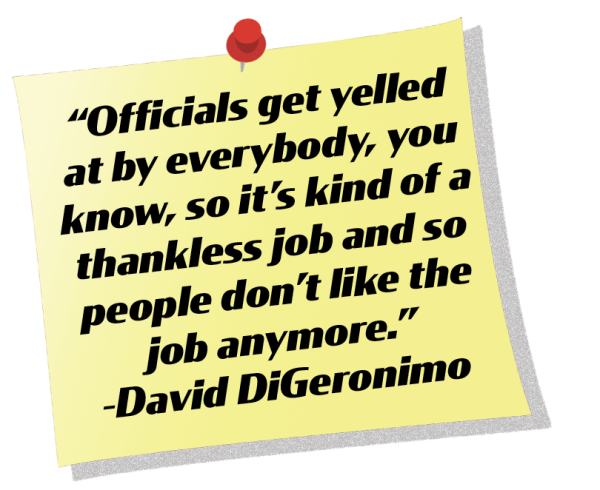
“An intense high-level game requires critical thinking and experience that many new referees lack,” Dye said.
Normally, high-level games such as CCS games call for expertise and vigorous training that comes with experience in the profession.
“[Previously], you earned your way to being able to ref higher games because [CCS] wanted to make sure they had the right people on the right games, and now they just put them wherever because they just don’t have much of a choice,” Dye said. “They don’t have enough people to cover the games, there’s times now when they have to put one referee on a game that’s a high-level game like SCVAL finals.”
The main reason for the loss of referees in youth sports is the harassment that they undergo.
“Officials get yelled at by everybody, so it’s kind of a thankless job and so people don’t like the job anymore, so young guys aren’t coming in,” DiGeronimo said. “One of the reasons [for the shortage] is because the refs that have been around forever are aging out and they can’t do it anymore; they’re in their 60s and 70s.”
A mix of aggressive sports culture and aging present referees doesn’t exactly make an environment fostering new-coming referees.
“We’re in a society where it’s ‘me, me, me, I know everything,’” Dye said. “They feel that they’re not going to respect somebody else if they don’t get what they want.”
According to the 2023 National Officiating Survey of 35,800 referees conducted by the National Association of Sports, 50.91% of officials have felt unsafe or feared for their safety because of administrator, coach, player, or spectator behavior.
or refs to state that parents cause the most issues with sportsmanship, with coaches, and fans coming next. This presents a dilemma as the parents and coaches who are most responsible for improving sportsmanship are the ones causing the most harm.
Across the country, over two-thirds of respondents to the survey have had a spectator removed for poor behavior. Additionally, around 87% of referees felt as if they were treated unfairly by fans.
“I’ve kicked parents off the deck, I have yellow-carded entire teams’ parents who weren’t behaving,” Dye said.
The trouble with the shortage arises when possible new candidates are deterred by the definite harassment they would have to undergo as a part of the profession.
“People just don’t want to be abused, [they] just naturally don’t want to get yelled and screamed at,” Dye said.
Any person in a new profession would be more vulnerable to criticism as they don’t have the confidence through experience, and as a result of this many new young referees are deterred by the heavy criticism they receive, warranted or not.
Additionally, while it has gotten more laid back, becoming a referee is no easy process.
“Ever since I started refereeing there have been changes periodically throughout the last 20 years and it’s hard to keep up with it, they’ve made some changes and then changed back frequently,” Dye said.
While some sports like soccer and football contain rigorous tests both mentally and physically, other more niche sports remain more laid back due to the shortage.
“When I first started [refereeing in CCS], there was a test you had [to pass] to show a certain bit of knowledge, then they put you on lower games until you worked up some experience,” Dye said. “To be honest with you, [today] they have such a shortage right now that you pretty much [only] get on-the-job training.”
In many of the high school sports, to become a referee you must complete online courses totaling around 5 hours, as well as courses on how to handle disputes and keep rowdy parents in check.
According to the NFHS, the same amount of people who stopped refereeing expressed interest in starting to officiate, but the number of people to go through with getting certified was nowhere close to keeping up with the losses.
An estimated cost of $275 is required to become a football referee, as opposed to a normal job where all you need is a resume and an application. Hours of training as well as recertification yearly are needed to be a ref.
According to the official CCS website, soccer referees can get paid $85 individually per game, lacrosse $90, and basketball $90 per game. Referees are forced to take multiple games and take on other jobs to support themselves, with refereeing usually being only a part-time job.
According to the National Officiating Survey, 60% of refs felt that they were underpaid, but accepted that budget constraints were contributing to their low pay. Many people are turned away from refereeing as it would most likely have to be a job on the side; the money alone isn’t enough to entice people to become referees, a love for the game is needed.
Even so, refereeing is a great job opportunity for young people who are not full-time workers, especially teenagers like youth soccer ref and freshman Peter Revenaugh.
“I think [reffing] is a good job because you can choose your games, but also you get paid 35 to 45 dollars per game,” he said.
For high schoolers such as Revenaugh, the pay is not the only positive aspect of the sport.
“I’m mostly refereeing games with really young kids, which can be really boring to watch, but it feels good giving back to the sport”, Revenaugh said.
Suggestions have been made in communities and bodies of high school athletics (such as CCS) on how to fix the shortage. As the stem of the problem comes from the abuse towards officials, many recommendations aim to calm the audience and players, as well as prepare referees.
CCS has put out statements urging sportsmanship, and trying to emphasize that referees may make mistakes, and that mistakes happen as a natural part of the game. In many CCS sports, athletic directors are forced to talk to teams before heading into the tournament about sportsmanship and fair play.
Across the country, over two-thirds of respondents to a survey of 35,800 officials have had a spectator removed for poor behavior. To lower that number, sections such as CCS have adopted a contract about sportsmanship that schools must complete before the season. In such contracts, coaches have criteria to follow such as presentations to players and parents about sportsmanship, and displaying posters and signs praising sportsmanship in CCS play.
As a part of referee training, they must undergo classes on how to diffuse fights and disputes, as well as how to handle abuse from referees. Veteran referees encourage new people to come into the game, but also warn about what is required from them.
“You just have to know how to not let people get to you,” Dye said. “As long as you feel confident knowing the rules, when they bark at you, you can just ignore them, you have to understand what power you have.”
Although there are attempts at controlling the refereeing shortage, there is still much work to do.
“Since I’ve been involved in the sport for 30 years, it’s amazing to me that they haven’t figured out a way to contain the parents even more and put down more problems with the parents or the coaches based on how they treat refs,” Dye said.
Through the ups and downs of sports, referees have always been there. When we think about referees, we only remember the calls that frustrated us, not the fact that they put in so much time and effort to give back to their community.
“When you have good teams and good coaches and you get to see the flow of the game [as a referee] it’s fun to be a part of that, and you try and just stay with the flow and not stick out,” Dye said.
Overall, the narrative on the current refereeing situation is clear; youth sports need more referees, and quickly. The effects of this shortage can be felt across the country, and if we want to preserve our favorite sports, we can help achieve this by supporting our officials with the appreciation they deserve.
